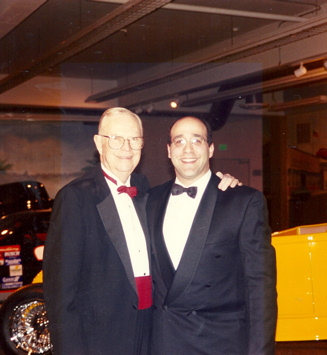The world of medicine lost a true giant this month when Dr. William F. House passed away. Dr. House pioneered many of the treatments we take for granted today in the treatment of ear and skull base diseases.
The world of medicine lost a true giant this month when Dr. William F. House
passed away. Dr. House pioneered many of the treatments we take for granted
today in the treatment of ear and skull base diseases. Known as the Father of
Neurotology, Dr. House was the first surgeon to develop the middle fossa
surgical approach using a microscope, and use of the otologic drill and irrigation
to remove tumors such as acoustic neuromas. He popularized the
translabyrinthine approach for acoustic neuromas which preserved facial nerves
during surgery and reduced the mortality rate for patients with these tumors
from 40 percent to less than 2 percent.
Like many visionaries who are ahead of their time, Dr. House often found
himself the center of controversy over his work. Dr. House devised new surgical
techniques—such as laying the patient down during surgery, rather than having
them sit up—that have become standard practice today. Dr. House also developed
the cochlear implant for patients with severe deafness. His colleagues felt his
use of cochlear implants was not studied well enough to be in widespread use,
but Dr. House’s patients were benefitting from restored hearing with his new
device. Today, cochlear implants are a standard treatment for patients with
severe deafness.
Ever the progressive innovator, Dr. House joined his brother Howard in
establishing the House Ear Institute in Los Angeles in the 1980s to conduct
research and develop new treatments for middle and inner ear disorders. The
brothers ran the Institute for years until Dr. Bill—as he was fondly known to
patients—decided to focus solely on private practice. By then, he had earned an
international reputation and had travelled the world teaching other surgeons in
South Africa, Europe and Asia the techniques he had developed. The American
Medical Association bestowed its highest honor on Dr. House in 1974, the
Distinguished Service Award. The Royal Society of Medicine in London named him
an honorary member in 1979. And the American Otological Society honored him with
its highest accolade, the Irving S. Cutter Gold Medal for outstanding
contributions to medicine. Dr. Bill established a highly successful office in
Newport Beach until he retired from private practice in 2001 at the age of 78.
I was fortunate to join Dr. Bill in his Newport Beach practice in 1999,
where I worked with him until he retired. I consider him a mentor and friend.
When he retired, Dr. Bill asked me to continue working with his patients. To
this day, I have many patients come into the office and reminisce on their fond
memories of Dr. Bill. Our office manager, Mary Kay Bishop, spent many years
with Dr. Bill as his administrator and has fond memories as well. “He was a
true visionary,” MaryKay has said on more than one occasion. “We actually had
an electronic medical record 20 years ago, before it ever became a standard in
patient care. But what distinguished Dr. Bill was his dedication to his
patients. They loved him. He helped so many of them with his willingness to
develop new methods of treatment. The practice of neurotology simply would not
be where it is today without Dr. Bill.”
He was beloved by his patients and admired by his colleagues. On a personal
note, I will miss Dr. Bill and am extremely fortunate and grateful for the
opportunity to have known him.
